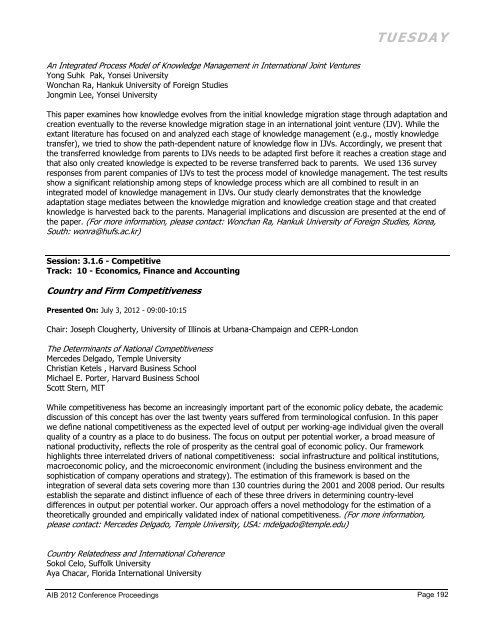AIB 2012 Conference Proceedings - Academy of International ...
AIB 2012 Conference Proceedings - Academy of International ...
AIB 2012 Conference Proceedings - Academy of International ...
Create successful ePaper yourself
Turn your PDF publications into a flip-book with our unique Google optimized e-Paper software.
TUESDAY<br />
An Integrated Process Model <strong>of</strong> Knowledge Management in <strong>International</strong> Joint Ventures<br />
Yong Suhk Pak, Yonsei University<br />
Wonchan Ra, Hankuk University <strong>of</strong> Foreign Studies<br />
Jongmin Lee, Yonsei University<br />
This paper examines how knowledge evolves from the initial knowledge migration stage through adaptation and<br />
creation eventually to the reverse knowledge migration stage in an international joint venture (IJV). While the<br />
extant literature has focused on and analyzed each stage <strong>of</strong> knowledge management (e.g., mostly knowledge<br />
transfer), we tried to show the path-dependent nature <strong>of</strong> knowledge flow in IJVs. Accordingly, we present that<br />
the transferred knowledge from parents to IJVs needs to be adapted first before it reaches a creation stage and<br />
that also only created knowledge is expected to be reverse transferred back to parents. We used 136 survey<br />
responses from parent companies <strong>of</strong> IJVs to test the process model <strong>of</strong> knowledge management. The test results<br />
show a significant relationship among steps <strong>of</strong> knowledge process which are all combined to result in an<br />
integrated model <strong>of</strong> knowledge management in IJVs. Our study clearly demonstrates that the knowledge<br />
adaptation stage mediates between the knowledge migration and knowledge creation stage and that created<br />
knowledge is harvested back to the parents. Managerial implications and discussion are presented at the end <strong>of</strong><br />
the paper. (For more information, please contact: Wonchan Ra, Hankuk University <strong>of</strong> Foreign Studies, Korea,<br />
South: wonra@hufs.ac.kr)<br />
Session: 3.1.6 - Competitive<br />
Track: 10 - Economics, Finance and Accounting<br />
Country and Firm Competitiveness<br />
Presented On: July 3, <strong>2012</strong> - 09:00-10:15<br />
Chair: Joseph Clougherty, University <strong>of</strong> Illinois at Urbana-Champaign and CEPR-London<br />
The Determinants <strong>of</strong> National Competitiveness<br />
Mercedes Delgado, Temple University<br />
Christian Ketels , Harvard Business School<br />
Michael E. Porter, Harvard Business School<br />
Scott Stern, MIT<br />
While competitiveness has become an increasingly important part <strong>of</strong> the economic policy debate, the academic<br />
discussion <strong>of</strong> this concept has over the last twenty years suffered from terminological confusion. In this paper<br />
we define national competitiveness as the expected level <strong>of</strong> output per working-age individual given the overall<br />
quality <strong>of</strong> a country as a place to do business. The focus on output per potential worker, a broad measure <strong>of</strong><br />
national productivity, reflects the role <strong>of</strong> prosperity as the central goal <strong>of</strong> economic policy. Our framework<br />
highlights three interrelated drivers <strong>of</strong> national competitiveness: social infrastructure and political institutions,<br />
macroeconomic policy, and the microeconomic environment (including the business environment and the<br />
sophistication <strong>of</strong> company operations and strategy). The estimation <strong>of</strong> this framework is based on the<br />
integration <strong>of</strong> several data sets covering more than 130 countries during the 2001 and 2008 period. Our results<br />
establish the separate and distinct influence <strong>of</strong> each <strong>of</strong> these three drivers in determining country-level<br />
differences in output per potential worker. Our approach <strong>of</strong>fers a novel methodology for the estimation <strong>of</strong> a<br />
theoretically grounded and empirically validated index <strong>of</strong> national competitiveness. (For more information,<br />
please contact: Mercedes Delgado, Temple University, USA: mdelgado@temple.edu)<br />
Country Relatedness and <strong>International</strong> Coherence<br />
Sokol Celo, Suffolk University<br />
Aya Chacar, Florida <strong>International</strong> University<br />
<strong>AIB</strong> <strong>2012</strong> <strong>Conference</strong> <strong>Proceedings</strong><br />
Page 192

















